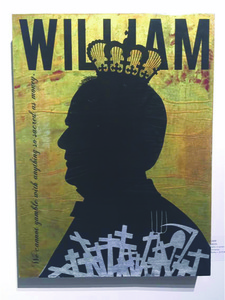

"William" is by R. L. Gibson
Politics and art have a long history together, and Eric Drummond Smith thinks it's a deep and profound relationship.
"I think art is a fundamental way of memorably connecting to people," Smith says, "and politics is profoundly human. For me the two things that make humans different from anything else are we naturally make art and naturally engage in politics. Other animals do everything else we do, with the possible exception of religion and philosophy.
"Politics is about everything we do and about power and influence, and art is one of the principal mechanisms – all the arts, not just the visual arts – of that. Art interprets events, it adds emotional content, it can change the way we see present and past events. It gives us our narrative. I think politics usually recognizes that. Right now in America, it's actually a little disappointing. Since the "90s political art has gotten stultified. There are some exceptions, such as Shepherd Fairey, but most of it is junk. There will be two names and a little swirly thing. In the old days, those guys knew how to play on our sympathies.
"I don't really understand this new trend. From the Medici in Florence, to the Romans and the Founding Fathers who brought in Layfette to design Washington, D.C., sometimes there's a real consciousness of that relationship, but right now it's really depressing in part, because there is no art to the politics.
"That is part of the motivation for this show – to illustrate how Appalachians – modern Appalachians – express their political nature artistically," he says.
Smith is combining his two professions in this exhibit. As an artist, he wants people to appreciate the art and as he puts it, "buy art from these people." As a political scientist, he wants people to be happy about elections and being a part of a democratic republic.
"In the American Republic few things are more universal than our collective interest in and disdain for democratic politics. Whether we're imagining our ancestors reading broadside newspaper articles to one another on the steps of their local post offices or our peers today engaging in collective, almost stream-of-conscience debates through the various mediums of the Internet age, we are an intensively political people. Our culture is that of democratic republicanism, with its equal shares of beauty and muck.
"I want people to be happy about elections. There are 330 million of us, and we rule a continent for all intents and purposes. It's ours. It's not a guy with a crown, it's not a dictator, it's us, and we hate ourselves for it. We're really jerks about it, it makes us make bad decisions sometimes, and it makes us cynical. Elections are our most American moment," Smith says.
Because Smith sees Election Day as such an important event, he's planning an old-fashioned hootenanny at the museum. The event runs from noon to midnight.
"We're going to have a place where people can watch returns. People who write or report on politics can come and set up camp. We're looking for musicians to play, and we'll have food and beer. We want it to be reminiscent of 20th-century Election Day parties. Back then, the returns would be counted, people would run out of the courthouse and tell the crowd what had come in across the telegraph. People would shout or cuss depending on their mood, and eat, drink and be merry. That's what we're going for. I want people to meet each other, I want connections to be made, and I want people to enjoy the process.
"Ultimately this is a love letter to everything I love: Appalachia, art, politics and America. I really love it. I love what we've done. The people at William King Museum have done so much work, and they're still working. Every time I have an idea, it's more work for them and they're amazing. I love it, and I hope people take advantage of the opportunity to engage with the show.
BACK TO THE MAIN STORY